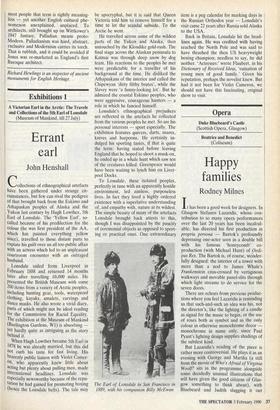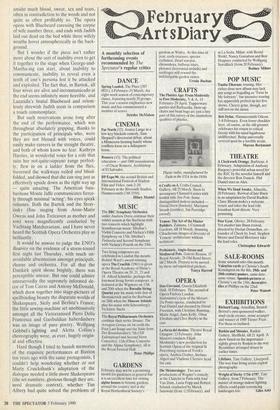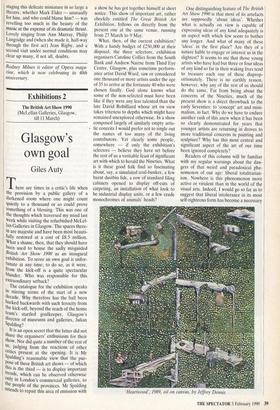Opera
Duke Bluebeard's Castle (Scottish Opera, Glasgow)
Happy families
Rodney Milnes
It has been a good week for designers. In Glasgow Stefanos Lazaridis, whose con- tribution to so many opera performances over the last 20 years has been incalcul- able, has directed his first production in propria persona — Bartok's profoundly depressing one-acter seen in a double bill with his famous 'honeycomb' co- production (with Michael Hunt) of Oedi- pus Rex. The Bartok is, of course, wonder- fully designed: the interior of a tower with more than a nod to James Whale's Frankenstein criss-crossed by vertiginous walkways and movable panel-slits through which light streams to do service for the seven doors.
There are echoes from previous produc- tions where you feel Lazaridis is reminding us that such-and-such an idea was his, not the director's, like the lighting of a candle as signal for the music to begin, or the use of roses both as symbol and as the only colour in otherwise monochrome decor — monochrome in name only, since Paul Pyant's lighting design supplies shadings of the subtlest kind.
But Lazaridis's reading of the piece is rather more controversial. He plays it as an evening with George and Martha (a still from the movie of Who's Afraid of Virginia Woolf? sits in the programme alongside some decidedly unusual illustrations that will have given the good citizens of Glas- gow something to think about), with Bluebeard and Judith slugging it out amidst much blood, sweat, sex and tears; often in contradiction to the words and not quite as often profitably so. The opera opens with Bluebeard caressing the corpse of wife number three, and ends with Judith laid out dead on the bed while three wifely wraiths hover atmospherically in the back- ground.
But I wonder if the piece isn't rather more about the sort of inability even to get it together to the stage when George-and- Martha-ing can start, about inability to communicate, inability to reveal even a tenth of one's persona lest it he attacked and exploited. The fact that, in Bartok, all four wives are alive and incommunicado at the end seems infinitely more horrible, and Lazaridis's brutal Bluebeard and relent- lessly shrewish Judith seem in comparison a touch commonplace.
But such reservations arose long after the end of the performance, which was throughout absolutely gripping, thanks to the participation of principals who, were they are not blessed with voices, could easily make careers in the straight theatre, and both of whom know no fear. Kathryn Harries, in wonderful voice for a role that suits her not-quite-soprano range perfect- ly, flew in on a ladder frOm the flies, traversed the walkways veiled and blind- folded, and showed that she can sing just as effectively upside down as the right way up — quite amazing. The American bass- baritone Monte Jaffe communicates fierce- ly through minimal 'acting': his eyes speak volumes. Both the Bartok and the Strav- insky (fine singing from Anne-Marie Owens and John Treleaven as mother and son) were magnificently conducted by Vachtang Matchavariani, and I have never heard the Scottish Opera Orchestra play so brilliantly.
It would be unwise to judge the ENO's Beatrice on the evidence of a storm-tossed first night last Thursday, with much un- avoidable absenteeism amongst principals, chorus and orchestra. For all that the Dunkirk spirit shone brightly, there was perceptible unease. But one could admire unreservedly the supremely informed de- cor of Tom Cairns and Antony McDonald, which drew together into stage-pictures of spellbinding beauty the disparate worlds of Shakespeare, Sicily and Berlioz's France; the little sewing-machine set unobtrusively amongst all the Victorianised Piero Della Francesca and Garibaldian haberdashery was an image of pure poetry. Wolfgang Gobbel's lighting and Aletta Collins's choreography were, as ever, hugely origin- al and effective.
Hard though I tried to banish memories of the exquisite performances at Buxton ten years ago with the same protagonists, I couldn't help wondering whether or not Marty Cruickshank's adaptation of the dialogue needed a little. more Shakespeare (the set numbers, glorious though they are, need dramatic context), whether Tim Albery had quite solved the problems of
staging this delicate miniature in so large a theatre, whether Mark Elder — unusually for him, and who could blame him? — was revelling too much in the beauty of the music at the expense of its dramatic thrust. Lovely singing from Ann Murray, Philip Langridge and (when she made it, half-way through the first act) Jean Rigby, and a second visit under normal conditions may clear up many, if not all, doubts.
Rodney MiMes is editor of Opera maga- zine, which is now celebrating its 40th anniversary.




















































 Previous page
Previous page